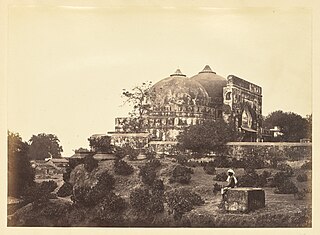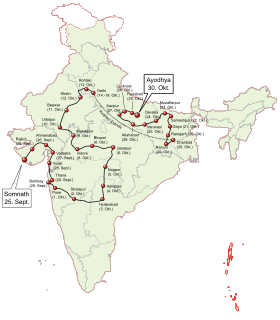
The Rashtriya Swayamsevak Sangh is an Indian right-wing, Hindu nationalist, paramilitary volunteer organisation. The RSS is the progenitor and leader of a large body of organisations called the Sangh Parivar, which have presence in all facets of the Indian society. RSS was founded on 27 September 1925. As of 2014, it has a membership of 5–6 million.
Hindutva (transl. Hinduness) is the predominant form of Hindu nationalism in India. The term was coined by Chandranath Basu and was propounded as a political ideology by Vinayak Damodar Savarkar in 1923. It is used by the organisation Rashtriya Swayamsevak Sangh (RSS), the Vishva Hindu Parishad (VHP), the Bharatiya Janata Party (BJP) and other organisations, collectively called the Sangh Parivar.

Swami Chinmayananda Saraswati was a Hindu spiritual leader and a teacher. In 1951, he founded Chinmaya Mission, a worldwide nonprofit organisation, in order to spread the knowledge of Advaita Vedanta, the Bhagavad Gita, the Upanishads, and other ancient Hindu scriptures. Through the Mission, Chinmayananda spearheaded a global Hindu spiritual and cultural renaissance that popularised these spiritual texts and values, teaching them in English all across India and abroad.

The Bajrang Dal is a Hindu nationalist militant organisation that forms the youth wing of the Vishva Hindu Parishad (VHP). It is a member of the right-wing Sangh Parivar. The ideology of the organisation is based on Hindutva. It was founded on 1 October 1984 in Uttar Pradesh, and began spreading more in the 2010s throughout India, although its most significant base remains the northern and central portions of the country.
The Sangh Parivar refers, as an umbrella term, to the collection of Hindu nationalist organisations spawned by the Rashtriya Swayamsevak Sangh (RSS), which remain affiliated to it. These include the political party Bharatiya Janata Party, religious organisation Vishva Hindu Parishad, students union Akhil Bharatiya Vidyarthi Parishad (ABVP), religious militant organisation Bajrang Dal that forms the youth wing of the Vishva Hindu Parishad (VHP), and the worker's union Bharatiya Kishan Sangh. It is also often taken to include allied organisations such as the Shiv Sena, which share the ideology of the RSS. The Sangh Parivar represents the Hindu nationalist movement of India.
The Hindu Forum of Britain is an umbrella organisation of Hindu groups in the United Kingdom. The organization has ties with Hindu nationalist organizations of India and scholars have observed parallels between its discourse and hardline Hindutva.

Hindu Hriday SamratAshok Singhal was the international working president of the Hindu organisation Vishva Hindu Parishad (VHP) for over 20 years and in charge of the Ayodhya Ram Janmabhoomi movement. He was replaced in the Vishva Hindu Parishad in December 2011 following a long bout of diminishing physical health. Succeeded by Praveen Togadia, Singhal suffered ill-health but was working till a month before his death.

Sadhvi Nisha Rithambara is a Hindu nationalist ideologue and the founder-chairperson of Durga Vahini.

Yātrā, in Indian-origin religions, Hinduism, Buddhism, Jainism and Sikhism, generally means a pilgrimage to holy places such as confluences of sacred rivers, sacred mountains, places associated with Hindu epics such as the Mahabharata and Ramayana, and other sacred pilgrimage sites. Visiting a sacred place is believed by the pilgrim to purify the self and bring one closer to the divine. The journey itself is as important as the destination, and the hardships of travel serve as an act of devotion in themselves.

The Vishva Hindu Parishad (VHP) is an Indian right-wing Hindu organization based on Hindu nationalism. The VHP was founded in 1964 by M. S. Golwalkar and S. S. Apte in collaboration with Swami Chinmayananda. Its stated objective is "to organise, consolidate the Hindu society and to serve and protect the Hindu Dharma". It was established to construct and renovate Hindu temples, and deal with matters of cow slaughter and religious conversion.

The demolition of the Babri Masjid was illegally carried out on 6 December 1992 by a large group of activists of the Vishva Hindu Parishad and allied organisations. The 16th-century Babri Masjid in the city of Ayodhya, in Uttar Pradesh, had been the subject of a lengthy socio-political dispute, and was targeted after a political rally organised by Hindu nationalist organisations turned violent.
The Akhil Bharatiya Akhara ParishadABAP, one of the organizations of Hindu Sants (saints) and sadhus (ascetics) in India. The ABAP is composed of 14 akharas, or organisations of Hindu sants and sadhus. Nirmohi Akhara and Shri Dattatreya Akhara are two of the prominent akharas which are part of it.

Christophe Jaffrelot is a French political scientist and Indologist specialising in South Asia, particularly India and Pakistan. He is a professor of South Asian politics and history the Centre d'études et de recherches internationales (CERI) at Sciences Po (Paris), a professor of Indian Politics and Sociology at the King's India Institute (London), and a Research Director at the Centre national de la recherche scientifique (CNRS).
Shivram Shankar Apte, also known as Dadasaheb Apte, was a founder and first General Secretary of the Vishva Hindu Parishad.

The Ram Rath Yatra was a political and religious rally that lasted from September to October 1990. It was organised by the Bharatiya Janata Party (BJP) and its Hindu nationalist affiliates, and led by the then-president of the BJP, L. K. Advani. The purpose of the yatra was to support the agitation, led by the Vishwa Hindu Parishad (VHP) and its affiliates in the Sangh Parivar, to erect a temple to the Hindu deity Rama on the site of the Babri Masjid.

Ram ke Naam is a 1992 documentary by Indian filmmaker Anand Patwardhan. The film explores the campaign waged by the right-wing Hindu nationalist organisation Vishva Hindu Parishad to build a Ram temple at the site of the Babri Masjid in Ayodhya, as well as the communal violence that it triggered. A couple of months after Ram ke Naam was released, activists of the VHP and other Hindu nationalist groups demolished the Babri Masjid in 1992, provoking further violence. The film earned Patwardhan a wide recognition, and received several national and international awards.
Ghar Wapsi is the programme of religious conversion to Hinduism and Sikhism from Islam, Christianity and other religions, conducted by Indian Hindu nationalist organisations Vishva Hindu Parishad (VHP), Rashtriya Swayamsevak Sangh (RSS) and their allies. The term owes to the Hindu nationalist ideology that all people of India are ancestrally Hindu and, hence, conversion to Hinduism is one of "returning home" to their ancestral roots.
These are the references for further information regarding the Sangh Parivar.
Dalit Hindus, or Lower Class Hindus are Dalit community whose are adherent to Hinduism and are at the lowest rank of Varna system, who are either considered as Shudra or Avarna. They are mostly present in South Asian countries, mainly in India, Nepal, Pakistan and Bangladesh.

Ram Navami is a Hindu festival celebrating the birthday of Hindu deity Rama. It falls on the 9th day of the Chaitra month every year in the Hindu calendar, usually during the months of March–April. At least since 1979, if not earlier, Hindutva nationalist organisations, spearheaded by Rashtriya Swayamsevak Sangh (RSS) and Bharatiya Janata Party (BJP), have weaponised the festival to create Hindu–Muslim frictions, causing riots and deaths, in which the Muslims have been the major sufferers. Scholar Paul Brass states that Rama himself has been turned into a political emblem of the RSS family of organisations, and the Ram Navami processions are "led by or turned into provocative displays" by militant Hindutva organisations such as the Vishva Hindu Parishad (VHP) and Bajrang Dal.











